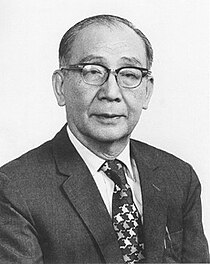Fang-kuei Li
| Li Fang-Kuei | |||||||||||||||||||
|---|---|---|---|---|---|---|---|---|---|---|---|---|---|---|---|---|---|---|---|
 |
|||||||||||||||||||
| Born | 20 August 1902 Guangzhou, Qing Empire |
||||||||||||||||||
| Died | 21 August 1987 (aged 85) San Mateo County, CA, United States |
||||||||||||||||||
| Residence | China United States |
||||||||||||||||||
| Nationality |
Republic of China United States |
||||||||||||||||||
| Fields | Linguistics | ||||||||||||||||||
| Institutions |
Yale University Academia Sinica University of Washington University of Hawaii |
||||||||||||||||||
| Alma mater |
Tsinghua University University of Michigan University of Chicago |
||||||||||||||||||
| Notable students |
W. South Coblin David R. Knechtges |
||||||||||||||||||
| Chinese name | |||||||||||||||||||
| Chinese | 李方桂 | ||||||||||||||||||
|
|||||||||||||||||||
| Transcriptions | |
|---|---|
| Standard Mandarin | |
| Hanyu Pinyin | Lǐ Fāngguì |
| Gwoyeu Romatzyh | Lii Fangguey |
| Wade–Giles | Li3 Fang1-kuei4 |
| IPA | [lì fáŋku̯êi̯] |
| Yue: Cantonese | |
| Yale Romanization | Léih Fōng-gwai |
| Jyutping | Lei5 Fong1-gwai3 |
Li Fang-Kuei (20 August 1902 – 21 August 1987) was a Chinese linguist, known for his studies of the varieties of Chinese, and for his reconstructions of Old Chinese and Proto-Tai.
Li Fang-Kuei was born on 20 August 1902 in Guangzhou during the final years of the Qing dynasty to a minor scholarly family from Xiyang, a small town in Shanxi roughly 50 kilometers (31 mi) south of Yangquan. Li's father Li Guangyu (Chinese: 李光宇) received his jinshi degree in 1880 and served in minor official posts in the late 19th to early 20th century.
Li was one of the first Chinese people to study linguistics outside China. Originally a student of medicine, he switched to linguistics when he went to the United States in 1924. He gained a BA in linguistics at the University of Michigan in 1926 after only two years of study. He then did graduate study under Edward Sapir and Leonard Bloomfield at the University of Chicago. Li conducted field studies of American Indian languages. His first exposure to fieldwork was his study of the Mattole language of northern California. He received an MA in 1927 and a PhD in 1928, and his dissertation Mattole: An Athabaskan Language was published in 1930.
In 1929 he returned to China and, along with Y.R. Chao and Luo Changpei, became a researcher at the Institute of Historical Linguistics (Chinese: 歷史語言研究所; pinyin: Lìshǐ yǔyán yánjiūsuǒ) of the Academia Sinica (then located at Beijing). From this point on, he performed field studies of several Tai languages (including the Zhuang people's Longzhou and Wuming dialects), while at the same time conducting deep investigations into Old Chinese and Tibetan. Li's revisions of Bernhard Karlgren's reconstructions of Middle Chinese and Old Chinese were widely used by students of ancient Chinese from their publication in the 1970s until the late 1990s.
...
Wikipedia
